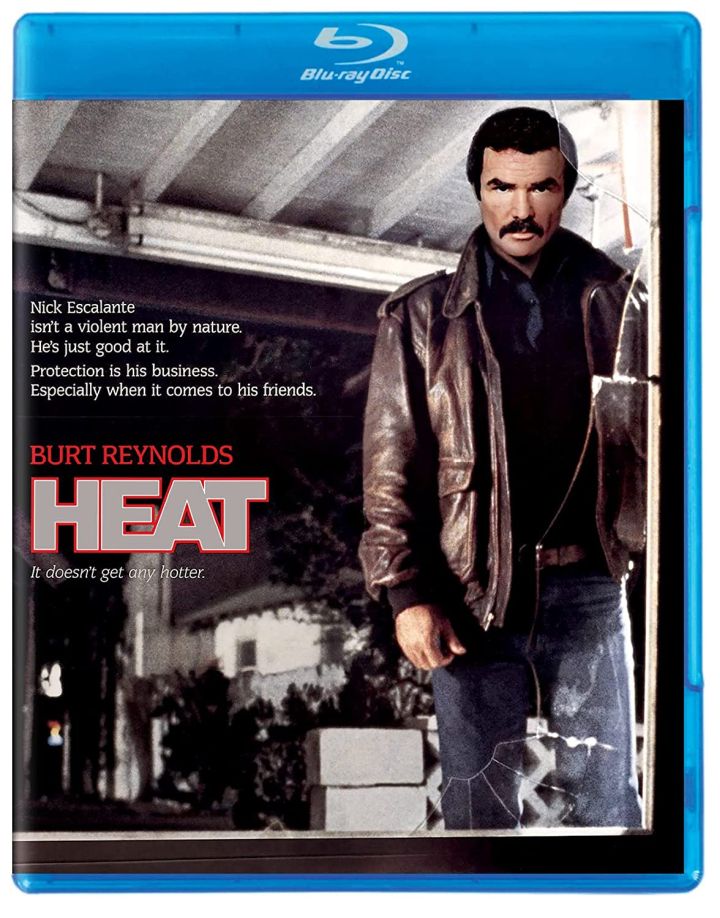
They call him “Mex.” His name is Nick Escaflante (Burt Reynolds), and we meet him drunk in a bar hitting on a blonde. She’s not interested and is just waiting for her date. When the date comes, Mex belittles him, steals his hairpiece, and does everything he can to goad the goober into a fight. Then Mex gets his ass kicked.
The next day, the goober meets Mex in his regular breakfast place and pays him for his trouble. It was all a put up, and one of the odd jobs Mex does to try to earn enough to get out of Vegas and go to Venice. He’s obsessed with Venice and has a simple goal: $100,000. Five years of life in Venice. After that… who cares?
Except an old girlfriend gets in contact, her face cut up and bashed. She tells a horror story about the man that did it and asks Mex to help find him. He says no. And of course, tracks the man down: Danny Demarco, the son of an East coast gangster. Mex dresses in the most ridiculous pimp costume to meet Demarco, who has two giants for bodyguards. He puts a gun in Mex’s face. Not a good idea.
There’s a fight. Mex doesn’t get touched but the gangster and his guards end up trussed for the wounded girl. She wants to cut off Danny’s manhood but settles for the $20,000 in his desk. That’s good for her; she can get out of town. Mex has to stay and face the consequences.
And part of that is babysitting a software millionaire that says he wants to hire Nick to be his bodyguard. What he really wants is a coach to teach him how to be a tough guy. Which involves being punched in the face.
Heat is a strange, disjointed film that has a strange, disjointed history. It’s from a screenplay by William Goldman, who also wrote the novel it’s based upon. That novel came out in 1985, the movie in 1986, but in that brief period six directors, including Robert Altman, were connected to the project. Dick Richards ultimately directed, until he got in a fight with Burt Reynolds who broke his jaw.
Coincidentally, the film is about the various levels of masculine expression. Kinnick (Peter MacNicol), the software millionaire, is materially successful but he doesn’t have any masculine energy. Demarco is all aggression with no control. It’s Mex who has all the control, and the real power… but he has his own weaknesses which keep him doing odd, crappy jobs. There are some good scenes, but the movie is as disjointed as its production history. It’s a series of decent scenes that belong in different good movies.
The opening with Nick being beaten up for hire is from a hard-edged comedy. The sequence where he confronts the gangster’s son starts as farce and becomes hard ’80s violence. Seriously, Mex kicks one of the bodyguard’s legs so the bone breaks the skin. Then there’s a long sequence of gambling at a casino, which belongs in a dramatic character study out of the ’70s.
Which leads to Nick training Kinnick in a serio-comic sequence that belongs in a buddy cop movie. But the story of the humiliated gangster’s son comes to a head when he and his goons come gunning. They end up in a factory that makes cinderblocks (and steam, apparently, in proper ’80s action fashion) where Nick dispatches his enemies with creative kills like he’s a slasher movie villain.
Heat has a decent pedigree, and some good scenes. But they come together in a severely disjointed manner. It mixes drama and comedy and some sick violence in a way that never gels. The film has an almost cascading series of tones that do not come together into a satisfying melody.
Which is a shame because it has some individual sequences that are often brilliant. The interaction between Mex and Cassie, the casino dealer, is beautifully written. She knows he’s on a gambling tear, and is destroying himself, but she must do her job. The scenes of Peter MacNicol essentially paying to be punched in the face are comic gold.
Heat has all the seeds of a good film, but they’re not growing in the same garden. Maybe it’s the result of different directors pulling the project in different directions, but the movie doesn’t quite do what it could. It’s entertaining. It’s occasionally poignant. But every scene points toward a different kind of movie it could have excelled at, had it been more focused.
Heat has been released on Blu-ray by Kino Lorber. Extras on the disc include a commentary track by film historians Brandon Bentley and Mike Leeder, an alternate ending, and a theatrical trailer.